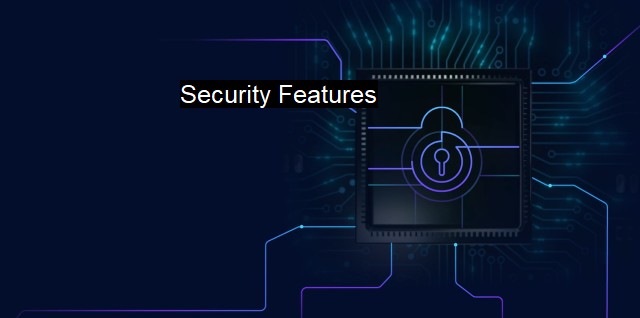What are Security Features?
The Importance of Security Features in Cybersecurity: Safeguarding your digital information against rapidly evolving threats
Security features indicate the various mechanisms designed and implemented to protect computer systems, networks, and data from potential attacks, damage, or unauthorized access. Rooted primarily these features encompass a wide array of attributes including stringent access controls, firewalls, encryption, and powerful antivirus or anti-malware software.The advancements in network systems have spurred an increasingly interconnected world. With this connectedness, the vulnerability to attack from malicious agents has dramatically increased. Around the globe, cybersecurity has grown immensely, emerging as an imperative tool to curb cybercriminal activities. This fight against varied and evolving cyber threats demands rigorous and robust security features.
One fundamental security feature is access control. This feature sets the ground rules for authorized entry, constraining the ability of user interaction with systems or data. They offer varying levels of restrictions, such as read/write authorizations and role-based privileges. Access control is effective in ensuring the safety of sensitive information and preventing unnecessary interference with data by unauthorized personal.
Firewalls form another significant breed of security features. They primarily serve as a good first line of defense from a range of cyber threats. A firewall's very job is to control and scrutinize network traffic, filtering what can pass through from one side of the network to the other. Variants like hardware firewalls and software firewalls exist, but more comprehensive versions, such as Next-Generation Firewalls (NGFWs), offer advanced features that provide more thorough inspection than traditional ones.
In the face of increased security breaches, encryption has emerged as a critical security feature. It converts data or information into an unreadable format for any user who does not possess the ‘decryption key.' The importance of these encrypted barriers to cyber-protection cannot be overstated, as strong encryption algorithms provide an almost impenetrable defense against unauthorized data breaches.
Finally comes the role of antivirus software, an absolute necessity in today's digital world. Antivirus utilities hunt for and eliminate any malicious software it comes across, thereby protecting the computer system from potential destruction or compromise. Some antivirus software also offers real-time threat detection, continuously monitoring your system for potential dangers. They identify malware often by signature-based detection, heuristic analysis, and behavior monitoring.
Additional security features include login audits, two-step verification, anti-phishing measures, and intrusion detection systems. Combining these with the aforementioned features equips a system with rigorous security cover.
The Internet and digital technology have redefined the human lifestyle on various fronts. the associated cybersecurity threats demand proficient countermeasures. In this quest, the security features play a central role, ensuring that systems are impenetrable, discouraging any unauthorized access, and upholding the integrity of our data and systems. They are not just a luxury but an absolute necessity with the ever-growing complexities of cyber threats. These multi-tiered protections are there to ensure that while technology attaches wings to human endeavors, those wings don't catch fire. the effective implementation of a robust shield of security features forms the bedrock of our safe digital explorations.

Security Features FAQs
What are security features?
Security features refer to the measures and technologies designed to protect computer systems, networks, and data from unauthorized access, theft, or damage. In the context of cybersecurity and antivirus, security features can include firewalls, encryption, anti-malware, anti-phishing, intrusion detection and prevention, and access control.Why are security features important in cybersecurity?
Security features are essential in cybersecurity because they help to ensure the confidentiality, integrity, and availability of information and systems. They can prevent unauthorized access, detect and block threats, and provide a strong line of defense against cyberattacks. Without adequate security features, computer systems and networks are vulnerable to cyber threats, which can result in data breaches, identity theft, financial loss, and reputational damage.What are some common security features in antivirus software?
Some common security features in antivirus software include real-time scanning of files and emails, heuristic scanning to detect new and unknown threats, quarantine of infected files, automatic updates of virus definitions, and anti-phishing and anti-malware protection. Advanced antivirus software may also include features such as behavioral analysis, sandboxing, and machine learning to detect and prevent new and sophisticated threats.How can I ensure that my security features are up-to-date?
To ensure that your security features are up-to-date, you should regularly update your antivirus and other security software to the latest version available. Most security software providers offer automatic updates or notification prompts for updates. You should also keep your operating system and other software up-to-date with the latest security patches and updates. Additionally, it is recommended to periodically review and adjust your security settings and access controls to ensure that they are appropriate and effective for your needs.| | A | | | B | | | C | | | D | | | E | | | F | | | G | | | H | | | I | | | J | | | K | | | L | | | M | |
| | N | | | O | | | P | | | Q | | | R | | | S | | | T | | | U | | | V | | | W | | | X | | | Y | | | Z | |
| | 1 | | | 2 | | | 3 | | | 4 | | | 7 | | | 8 | | |||||||